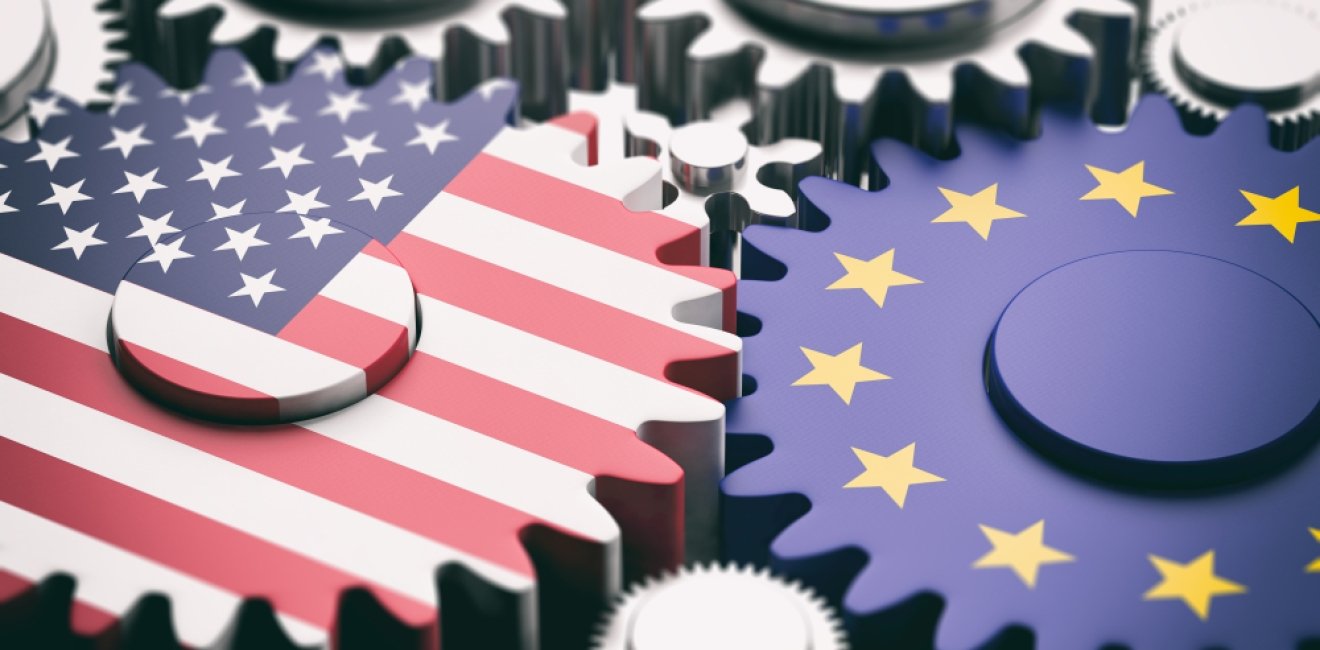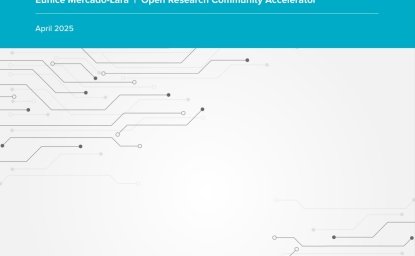As the second ministerial meeting of the U.S.-EU Trade and Technology Council (TTC) approaches, what should you be keeping an eye on? In the following compilation of seven expert quick takes, a diversity of trade and technology experts offer readers a peak into what to expect and not expect from, as well as the significance of, the upcoming TTC meeting on May 15th and 16th in France. Taken together, this collection of analysis captures the breadth of issues on the table and their importance for the U.S., EU, and transatlantic relations.
… slow, steady progress is more likely than major fireworks.
Kevin Allison, Vice President, Dentons Global Advisors – Albright Stonebridge Group
Erik Brattberg, Senior Vice President, Dentons Global Advisors – Albright Stonebridge Group
Paul Triolo, Senior Vice President, Dentons Global Advisors – Albright Stonebridge Group
Expect a warm atmosphere and a joint communique stressing shared democratic values and trans-Atlantic alignment when senior EU and U.S. officials gather for the second Trade and Technology Council principals’ meeting on May 15-16 in Saclay, near Paris. While recent global events have lent fresh urgency to U.S.-EU cooperation, slow, steady progress is more likely than major fireworks.
Russia’s war in Ukraine will have a big influence on the proceedings. The conflict has pushed Washington and Brussels closer together on issues like sanctions and export controls, with officials from both sides highlighting how the TTC helped facilitate a rapid and unified Western response to the Russian invasion. It has also made Russia more dependent on China for access to advanced technology, further raising the stakes of U.S.-EU policy cooperation.
Despite this positive momentum, the U.S. and EU must still bridge some significant differences on a broad set of trade and tech policy issues. This includes their respective approaches to regulating internet platforms. Moving from agreements on principles to alignment on policy, including on issues like subsidies for semiconductor manufacturing, supply chain resilience, digital governance, investment reviews, and other areas covered by the 10 TTC working groups will take time.
Supply chains for semiconductors and critical minerals and export control cooperation are among the specific policy areas to look for more concrete progress at the meetings in France. This month’s meetings could also see new initiatives on technology standards and common principles for AI governance.
Both partners need each other now more than ever.
Cedric Amon, ECCRI Fellow and Research Associate at the Multilateral Dialogue Geneva Konrad-Adenauer-Stiftung
The multilateral order is at a pivotal moment. Driven by desire to rekindle the strained relationship between the transatlantic partners, the Transatlantic Trade Council (TTC) must come up with concrete responses to some of today’s most pressing challenges. Small “successes” - such as the leveraging of early exchanges of the working group 7 on export controls cooperation in light of Russia’s invasion of Ukraine - are important to rebuild trust in the partnership and gain confidence in the partners’ efforts to uphold and defend shared values.
From an EU viewpoint, the timing of the next round of the TTC negotiations could not be better. The recent agreements on the Digital Services Act (DSA) and the Digital Markets Act (DMA), the publication of the EU Standardization Strategy and a number of other policies mean that the EU negotiators are quite clear on their positions.
Another promising field is that of Working Group 1 on Technology Standards. The TTC must lay a solid foundation for coordinated approach to international standardization. As the EU and U.S.’s participation in international standardization organizations took a backseat over the past years, a void has been created.
Gradually, this participation gap has been filled by states that aim to become world leaders in technology and manufacturing. But as emerging technologies are setting the course of new power relations, it is important to ensure that the development of technologies such as artificial intelligence (AI) is as inclusive as possible. Collaboration on standards must lead to a common understanding of the (digital) future that partners on both sides of the Atlantic are trying to shape. Shutting down standard proposals that challenge the openness of our networks (i.e. NewIP) or run counter to fundamental human rights is important but not sufficient. Moreover, if Europeans truly aim to build a lasting sense of “ethical artificial intelligence (AI)” it cannot be achieved without the leading nation in AI development. Both partners need each other now more than ever.
While China loomed large in the inaugural meeting in Pittsburg, Russia, with its invasion of Ukraine, will loom large in France.
Melissa K. Griffith, Director of Emerging Technology and National Security, Senior Program Associate, The Woodrow Wilson Center’s Science and Technology Innovation Program (STIP)
As the United States and the European Union meet in France for the second ministerial meeting of the TTC, they have a unique opportunity to re-cement and deepen the transatlantic relationship in an increasingly contested geopolitical environment. While China loomed large in the inaugural meeting in Pittsburg, Russia, with its invasion of Ukraine, will loom large in France. Observers should expect, however, technology policy to remain a central and sustained focus.
These national security and economic concerns – including critical infrastructure (e.g. 5G networks), foundational technology (e.g. semiconductors and their global supply chains), transformative technologies (e.g. Artificial Intelligence), and domains of fierce competition and cooperation (e.g. space and cyberspace) – have only become more pressing since the inaugural meeting last year. In the context of events in Ukraine alone, concerns around technology supply chains (both hardware and software) and malicious cyber operations, including operations targeting space-based infrastructure, have been front and center on both sides of the Atlantic.
Yet, the breadth and complexity of the issues on the table represent both a pressing need and a persisting challenge for the TTC. While broad statements of commitment and shared values are important, meaningful progress rests on concrete and often slow steps. We should see aspects of that concrete progress across each of the ten TTC working groups on public display alongside a strong commitment to sustain these efforts going forward. Keen observers should also expect to see lingering areas of tension as the U.S. and EU seek to navigate ongoing domestic policy efforts related to semiconductor manufacturing, digital platform governance, and privacy within a broader, cohesive transatlantic approach.
TTC … can play a vital role in shaping the development of [the semiconductor] industry for decades to come.
Don McLellan, International Co-Chair, The Woodrow Wilson Center National Cabinet; Partner at BDT & Company
Since the TTC's inaugural meeting in Pittsburgh, common economic and security interests of the EU and US have never been more front and center for policy makers and business leaders. At the heart of these interests lies the semiconductor industry. Semiconductors are the oil of this century, defining international relations, economic and human development, and innovation across virtually all industries. The TTC, through its various working groups, can play a vital role in shaping the development of this industry for decades to come. I am hopeful this meeting will begin to address longer-term strategic issues for the semiconductor industry, which go beyond ameliorating short-term supply chain constraints. Ensuring policy measures recognize global interdependencies and do not create unintended consequences or barriers to innovation, talent migration or intellectual property development over the long term is important.
Compelled to do so by the urgency of recent events and recognition of critical choke points in the semiconductor supply chain, countries and regions have taken bold and laudable steps to incentivize the development of advanced manufacturing capabilities on their own soil. The work of the TTC can help harmonize policies across the EU and US to ensure governments are not competing for the same factories, but rather creating robust ecosystems and centers of excellence where best-located in partnership with industry and academia. The work of the TTC in shaping the semiconductor industry can be a shining example of how cooperation on specific issues by the EU and US can lead to lasting, tangible outcomes benefitting the globe.
… the TTC will need to strive for greater actionable items and should not shy away from tackling the numerous economic gaps …
Jason Moyer, Program Associate, The Woodrow Wilson Center’s Global Europe Program
The U.S.-EU Trade and Technology Council (TTC) has emerged as the premier forum for the transatlantic relationship to discuss their economic partnership, address challenges of future technologies, and increase prosperity. Ahead of the TTC’s second meeting in France from May 15-16, trade representatives have hinted this round might include more Asian economies to bolster legitimacy, notably Japan, and indicated China’s disruptive economic practices would feature more prominently, especially in the aerospace sector. Previously, it was clearly stated that this would not become an anti-China cabal, but this might change. The first round of meetings of the 10 working groups in Pittsburgh last September led to a short list of concrete deliverables, namely declarations on investment screening, export controls, artificial intelligence, and semiconductors. This was a good start with victories in a few low-hanging areas of cooperation, but there are significant obstacles ahead. In order to avoid a sophomore slump, the TTC will need to strive for greater actionable items and should not shy away from tackling the numerous economic gaps exposed when the West heavily sanctioned the Russian economy. The disruption of Russian aggression will have long-term economic implications for all European economies, as well as the destruction of the Ukrainian economy, further highlighting the need to shore up gaps in supply chains, food security, energy, and rare earth minerals. We have seen unprecedented shows of unity in the face of Russia’s invasion of Ukraine in the military and political realms, but will we see the same transatlantic cooperation in the often fraught and thorny economic space?
… focus on specific common goals, avoiding abstract debates about the effects of technology on the economy and society.
Laura Tyson, Distinguished Professor of the Graduate School, Haas School of Business, University of California, Berkeley
John Zysman, Professor Emeritus, UC Berkeley/Co-director BRIE, Berkeley Roundtable on the International Economy
TTC was formed in significant part to secure the West’s position in strategic competition with China. The challenge is not just ensuring technological leadership, running faster than China. It is also the challenge of building productive, equitable digital economies, beginning with the transatlantic allies, extending over time to Japan and other Asian allies. These challenges are all the more important in the face of Russian aggression in Ukraine. Western unity to address China’s technological competition and to defeat Russia’s military aggression requires collaboration and trust based on a shared vision of mutually beneficial digital economies and societies and a rules-based international system.
TTC should focus on specific common goals, avoiding abstract debates about the effects of technology on the economy and society. General policy debates will only highlight different visions and domestic disputes among and within the allies. TTC should address common problems that warrant concrete immediate responses such as semiconductor supply, climate change, and sustaining innovation,. Semiconductors are an example, though climate could also serve. The shared objective should be a competitive, resilient, secure, and sustainable global industry, code-named CRSS. That requires geographically diffused production and innovation, not national technological autarky. There are two areas of potential TCC cooperation toward CRSS. All partners benefit from a geographic, indeed, corporate, dispersion of foundry production. Each partner must avoid wasting production subsidies bidding for foundry location, resulting not in more investment, but in more corporate profits for national champions. Second, shared R&D support to accelerate innovation from lab to fab can build trust by assuring that benefits are widely shared.
… both [The U.S. and Europe] are committed to the energy transition, and both face dramatic looming shortages of critical minerals …
Duncan Wood, Vice President for Strategy & New Initiatives, Senior Advisor to the Mexico Institute, The Woodrow Wilson Center
The United States and Europe share a common problem: both are committed to the energy transition, and both face dramatic looming shortages of critical minerals, particularly with regards to electric vehicle batteries. As a recent report from the Wilson Center notes, rather than approaching this challenge individually, it makes a great deal of sense for European and American authorities to work together on a multidimensional collaborative strategy. Finding new sources of critical minerals and bringing them to market as quickly as possible is clearly a priority, and European and North American mining firms already sell to each other’s markets. Sharing data on new mining projects and the development of processing and refining facilities is an important first step, but there is also much that can be done to strengthen the talent pool needed for mining, processing and the development of new innovations and technologies. Following on directly from this, the US and Europe should create a framework for research collaboration that emphasizes advances in battery technologies, especially those that reduce the use of minerals facing severe bottlenecks, especially cobalt. Lastly, it is high time that the two governments work together on new Environmental, Social and Governance (ESG) standards for the critical minerals industry. A focus on sustainability and human rights in the mining and processing sectors for critical minerals is an essential element to ensure that negative spillovers from the green energy transition are minimized.
Authors





Science and Technology Innovation Program
The Science and Technology Innovation Program (STIP) serves as the bridge between technologists, policymakers, industry, and global stakeholders. Read more

Explore More
Browse Insights & Analysis
360° View of How Southeast Asia Can Attract More FDI in Chips and AI



